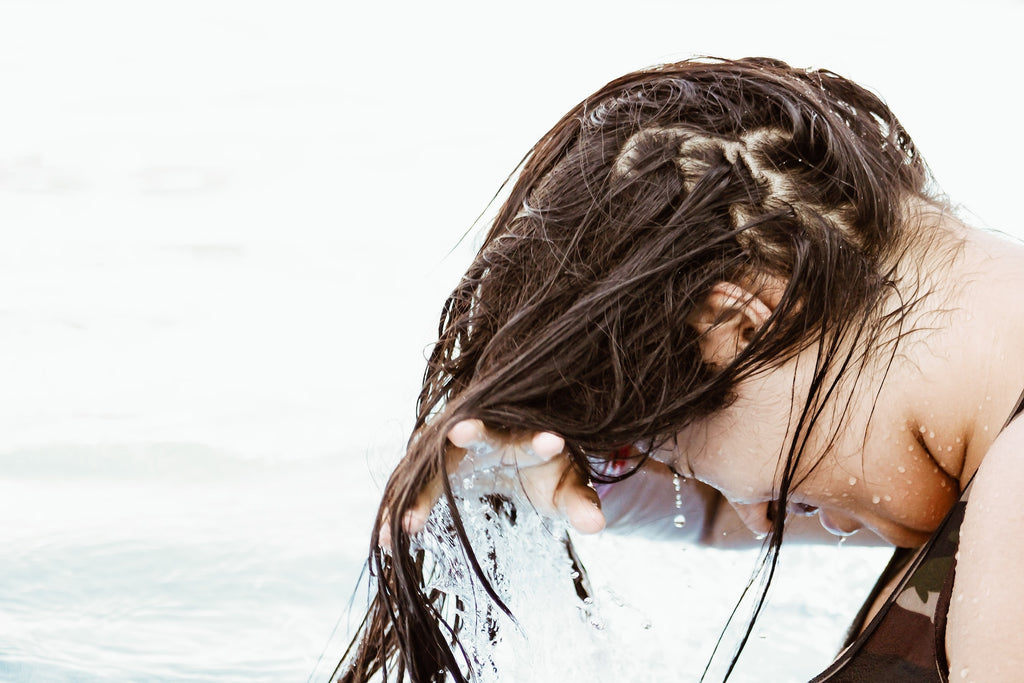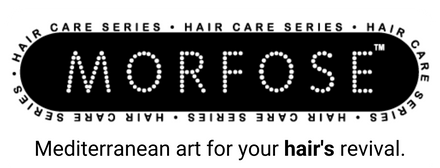How Often Should You Wash Your Hair? A Guide to Healthy Hair Care
Posted by MORFOSE COSMETICS

How Often Should You Wash Your Hair? A Guide to Healthy Hair Care
While many of us enjoy the feeling of freshly washed hair, the question remains, how often should you be washing your locks? The answer isn't always straightforward as it depends on your hair type, lifestyle, and personal habits that can all impact your hair washing needs. In this guide, we'll explore the various factors you should consider when deciding on the frequency of washing your hair for healthy hair care.
Understanding Hair Types and Washing Needs
Before we dive into how often you should be washing your hair, it's important to understand your hair type. Everyone's hair is unique, and different hair types require different levels of care. Here are the four main hair types:
- Straight hair
- Wavy hair
- Curly hair
- Coily hair
To determine your hair type, take a close look at your hair's texture, density, and curl pattern. Straight hair is typically fine and lacks body, wavy hair has a looser curl pattern and some volume, curly hair has tight curls or spirals, and coily hair is very tightly curled or coiled.
Factors Affecting Hair Washing Frequency
When deciding on the frequency of washing your hair, consider several factors, such as your hair type, skin type, and lifestyle factors. For instance, those with oily hair may need to wash their hair more frequently as their scalps produce more oil, while people with dry hair should limit their hair washing to avoid stripping away essential oils.
Other lifestyle factors that may affect your hair washing routine include your exercise routine, exposure to pollution, and use of styling products. If you exercise regularly, you may need to wash your hair more often to remove sweat and buildup. Similarly, if you live in a city with high pollution levels, you may need to wash your hair more frequently to remove pollutants from your hair. If you use a lot of styling products, such as hairspray or gel, you may need to wash your hair more often to remove buildup and prevent product buildup.
Customizing Your Hair Washing Routine
The key to a healthy hair care routine is to customize it to your specific needs. Once you've identified your hair type and the factors affecting your hair washing frequency, it's time to create a hair washing routine that works for you. You might start by washing your hair once or twice a week initially and adjust accordingly based on how your hair responds.
When washing your hair, be sure to use a shampoo and conditioner that are appropriate for your hair type. For instance, if you have oily hair, look for a clarifying shampoo that can help remove excess oil and buildup. If you have dry hair, look for a moisturizing shampoo and conditioner that can help hydrate and nourish your hair.
In addition to washing your hair, consider incorporating other hair care practices into your routine, such as deep conditioning treatments, scalp massages, and using a wide-tooth comb to detangle your hair. These practices can help improve the health and appearance of your hair.
Remember, everyone's hair is unique, and what works for one person may not work for another. Experiment with different hair care practices and products to find a routine that works best for you and your hair type.
The Science Behind Hair Washing
To understand how hair washing impacts your hair's health, let's take a look at the science behind it. Your scalp produces an oil called sebum, which is essential for healthy hair. Sebum helps to moisturize and protect your hair from damage. When you wash your hair, you remove some of the sebum, leading to dry and brittle hair.
The Role of Sebum in Hair Health
Sebum plays a vital role in keeping your hair healthy, shiny, and manageable. It moisturizes both your hair and scalp, making it more manageable and preventing it from becoming too dry. However, excessive sebum can lead to oily hair, which is why it's essential to find the right balance.
It's important to note that sebum production can vary depending on factors such as age, hormones, and diet. For example, during puberty, hormone levels increase, leading to an increase in sebum production. This is why teenagers often experience oily hair and acne.
How Shampoo and Conditioner Work
Shampoo is designed to cleanse your hair and scalp by removing dirt, excess oil, and product buildup. It contains ingredients such as surfactants, which help to break down and remove dirt and oil. Conditioner, on the other hand, is formulated to replenish moisture and essential oils lost during the washing process. It contains ingredients such as emollients, which help to smooth and soften the hair.
It's important to choose a shampoo and conditioner that are appropriate for your hair type. For example, if you have dry hair, you may want to choose a moisturizing shampoo and conditioner. If you have oily hair, you may want to choose a clarifying shampoo and a lightweight conditioner.
The Impact of Overwashing and Underwashing
Washing your hair too often or not often enough can have a significant impact on your hair health. Overwashing can strip your hair of its natural oils, leading to dry, brittle hair. On the other hand, underwashing can lead to product buildup, clogged follicles, and an itchy scalp.
So how often should you wash your hair? It depends on your hair type and lifestyle. If you have oily hair, you may need to wash it every day or every other day. If you have dry hair, you may only need to wash it once or twice a week. If you exercise frequently or live in a humid climate, you may need to wash your hair more often to remove sweat and dirt.
It's also important to note that washing your hair isn't the only factor that impacts its health. Other factors, such as diet, stress, and styling practices, can also have an impact. Eating a balanced diet rich in vitamins and minerals can help to promote healthy hair growth. Managing stress levels and avoiding tight hairstyles can help to prevent hair loss and breakage.
In conclusion, understanding the science behind hair washing can help you make informed decisions about how to care for your hair. By finding the right balance between washing and moisturizing, you can help to promote healthy, shiny, and manageable hair.
Hair Washing Techniques for Different Hair Types
Having a good hair washing technique is essential to maintaining healthy hair. Once you've identified your hair type, you can choose a hair washing technique that works best for you. Here are some tips for washing different hair types:
Washing Tips for Straight Hair
Straight hair is often fine and easily weighed down, so it's crucial to use a light shampoo and conditioner. When washing your hair, use lukewarm water to avoid making your hair greasier. Avoid scrubbing your scalp too hard, as this can cause irritation and lead to dandruff. Instead, massage your scalp gently with your fingertips to stimulate blood flow and promote hair growth. After washing your hair, rinse it thoroughly to ensure that all the shampoo and conditioner are removed.
Washing Tips for Wavy Hair
Wavy hair needs moisture to keep frizz at bay, so it's essential to use a moisturizing conditioner. Use a wide-tooth comb to detangle your hair, starting from the ends and working your way up to the roots. Avoid washing your hair too often as it can weigh down your waves. Instead, try washing your hair every other day or every three days. When washing your hair, use lukewarm water and massage your scalp gently with your fingertips to promote blood flow. After washing your hair, rinse it thoroughly to ensure that all the shampoo and conditioner are removed.
Washing Tips for Curly Hair
Curly hair needs moisture to stay healthy and bouncy, so it's important to use a moisturizing conditioner that provides enough slip to detangle your curls. Consider using a sulfate-free shampoo that won't strip your hair of its natural oils. When washing your hair, use lukewarm water and massage your scalp gently with your fingertips to promote blood flow. After washing your hair, rinse it thoroughly to ensure that all the shampoo and conditioner are removed. To enhance your curls, scrunch your hair with a microfiber towel or cotton t-shirt to remove excess water. Avoid using a regular towel as it can cause frizz and breakage.
Washing Tips for Coily Hair
Coily hair tends to be drier than other hair types and requires a lot of moisture to stay healthy and vibrant. Use a moisturizing shampoo and deep conditioner once a week to keep your coils hydrated and healthy. When washing your hair, use lukewarm water and massage your scalp gently with your fingertips to promote blood flow. After washing your hair, rinse it thoroughly to ensure that all the shampoo and conditioner are removed. To prevent breakage, detangle your hair with a wide-tooth comb or your fingers while it's still wet and coated with conditioner. Avoid using a brush on your coily hair as it can cause damage and breakage.
By following these hair washing tips, you can keep your hair healthy, strong, and beautiful, no matter what your hair type is. Remember to be gentle with your hair and avoid using harsh chemicals or tools that can cause damage. With the right care, your hair can look and feel amazing every day!
Common Hair Washing Mistakes and How to Avoid Them
Now that we've covered the essentials of hair washing, let's take a look at some common hair washing mistakes you should avoid:
Using the Wrong Shampoo or Conditioner
Not all shampoos and conditioners are created equal. Using the wrong product for your hair type can cause more harm than good. Always choose a shampoo and conditioner that is specifically formulated for your hair type and concerns.
Washing Hair with Hot Water
Hot water can strip your hair of its natural oils, leaving it dry and brittle. Use lukewarm water to wash your hair, and finish with a cool rinse to help seal the hair cuticles.
Not Rinsing Thoroughly
Leftover shampoo or conditioner can weigh down your hair and cause product buildup. Ensure you rinse your hair thoroughly, with plenty of water to remove all remnants of product.
Overusing Hair Styling Products
Excessive use of hair styling products can cause product buildup, which can clog your hair follicles and cause scalp irritation. Use hair styling products in moderation and choose products that are suitable for your hair type and concerns.
Conclusion
How often you should wash your hair depends on several factors, including your hair type, skin type, and lifestyle habits. The key to a healthy hair care routine is to find a balance that works for you and customize your routine based on your unique hair washing needs. With the right hair washing techniques and products, you can achieve healthy, shiny, and beautiful hair.


